Published date
Related Collections from the Archive
From the book: A.I. Kajee His Work for the Southern African Indian Community by C. H. Calpin
In the middle thirties a case came before the Courts in which a European man avowed that he would marry a Native woman with whom he had been living for more than twenty years; He stated that the land owned by him had already been made over to the woman in his will. The man and the woman were sentenced under the Immorality Act, the man to six months and the woman to three months. There were two children of the marriage. In justifying the sentence imposed the Magistrate said that it was directed to break the alliance between the man and the woman, and he had every hope that the total change from present surroundings would "kindle the inherent spark of loyalty to his (the man's) national instincts" and lead him to a better life.
Mixed marriages and miscegenation are common to frontier societies. The Indian community in South Africa is remarkably free from them. There are very rare cases of marriages between Indians and Europeans within the country. Law in the Transvaal and the Free State forbids them, but before the Mixed Marriages Act of 1949 they were permissible in Natal and the Cape Province. The number of these marriages performed between 1925 and 1934 was 33 in the Cape and six in Natal. In the single year 1934 there were three in the Cape and Natal combined.
A question that was continually arising between 1930 and 1940 was the manner in which Indians, who, at the time, were forbidden from owning land in the Transvaal, could evade the law by marrying a European or Malay and owning land in the name of their wives. It was a regular thing for Nationalist M.P's to raise the question in Parliament and to call for inquiries into the extent to which the prohibition of ownership of land by Asiatics in the Transvaal was overcome by means of these marriages. There was a public outcry, too, against the employment of Europeans by Asiatics and a demand that the government should check both practices. The Government was awkwardly placed. General Hertzog was Prime Minister in a Coalition Ministry. The Cabinet consisted of an equal number of the followers of General Hertzog and of General Smuts. It contained men of such opposed upbringing and background as Mr. J. H. Hofmeyr and Mr. Oswald Pirow. It showed differences almost as great as those between the Calvinist and the Communist, between the Afrikaner doctrines crystallised in the statement, "there shall be no equality between black and white in church or state" and the Victorian declaration "all men shall be considered equal before the law".
The introduction of a private bill sponsored by General J. J. Pienaar, a United Party member, -the Prohibition of Mixed Marriages Bill-threw the Government into confusion. The Bill provided that no European should conÂtract a valid marriage with an Asiatic or Native in the Union. It did not include marriages between Europeans and Cape Malays and other coloured persons, but it placed the onus of proving race upon the parties to marriage.
The Bill was an attempt to modify a previous proposal sponsored by two Nationalists designed to prevent marriages between Europeans and any Coloured person, a proposal that met with such opposition all over the country that General Pienaar chose to divert attention purely to Indians and Natives. Introducing the Bill General Pienaar said that its main object was to remove the anomaly between the marriage and the immorality laws. What the immorality law forbade was made legal by the marriage laws outside the Transvaal. The Bill aimed at preventing the mixture of blood in South Africa. All races in South Africa should welcome it, for it would protect all alike. There were individuals in every race who did not respect the tradition that their race should be kept pure. They were usually the least worthy representatives of their race, and for that reason alone a mixed marriage was undesirable. Still less worthy was the generation born of such marriages, and they were recognised neither, by the Europeans, the Asiatics or the natives. "Theirs was indeed a tragedy."
It was in the debate on this Bill that the late Mr. J. H. Hofmeyr delivered what is looked upon as one of his greatest speeches. A question such as this lay itself open to all manner of misinterpretations and distortions. Whenever Mr. Hofmeyr spoke on race relations his words were given a meaning so contrary to his intention that they became completely unrecognisable. "This is unnecessary legislation," he declared. "It is dishonouring legislation. It is legislation that is unÂworthy of this House and this nation. I ask the House to look at it soberly and dispassionately and not be misÂlead by any false exploitation of sentiment."
There was another attack upon the honour of the Indian community in the White Womens' Employment Restriction Bill; This Bill proposed to forbid Asiatics from employing European women except under Ministerial authority. The proposal was a direct affront to Indians, for though Asiatics described the race to which the Bill referred, Japanese nationals were excluded. The reason for this was that an agreement existed between South Africa and Japan to facilitate an exchange of trade. A select committee was appointed to examine the proposed legislation. On it Mr. Hofmeyr served as ChairÂman.
It quickly became evident during the hearings of the select committee that Mr. Hofmeyr and Mr. Derbyshire were in the minority. The proceedings were followed with rising interest in the country. An anti-Asiatic storm was at its height, and it looked as if the Prime Minister might be carried away by it. Both he and Mr. Pirow were persuaded that the select committee would produce a Bill acceptable to Parliament and public, and that soon no white girl would be in the employ of an Asiatic. Rumours of a Cabinet split were headlined in the newspapers.
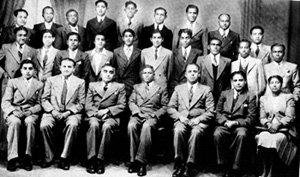 Top Row: G.H.E. Lockhat, JT. Hon. Treasurer, G. Tshabangu, B. Ramnarian, G. Rahman, E. Lazarus, M.C. Naidoo, D.C. Chetty, A.G. Moodley, E.M. Kajee
Top Row: G.H.E. Lockhat, JT. Hon. Treasurer, G. Tshabangu, B. Ramnarian, G. Rahman, E. Lazarus, M.C. Naidoo, D.C. Chetty, A.G. Moodley, E.M. Kajee
Second Row: Charles M. Pillay, JT. Hon. secretary, G.A. Jeewa, JT. Hon. Treasurer, R. Ramchand, JT. Hon. secretary, S.A. Kajee, E. Limalia, E.M. Timol, P. Goordeen, S.R. Pather, S.A. Pather, K.P. Govender.
Front Row: I.A. Kajee, E.I. Kajee, A. I. Kajee, Patron, A. Harry Naidoo, President, A.B. Moosa, Patron, J. Maganlal, Miss R Naidoo
 Sol. M. Paruk, Charles M. Pillay, A.G. Moodley, E.A. Timol, K.R. Govender, R. Ramchand, B.Ramnarian, G.H.E. Lockhat
Sol. M. Paruk, Charles M. Pillay, A.G. Moodley, E.A. Timol, K.R. Govender, R. Ramchand, B.Ramnarian, G.H.E. Lockhat
Commenting in a leading article entitled "What a Travesty", the Natal Mercury described the Bill "as the most ridiculous essay in tin-pot law-making ever to be attempted by the Platteland jurists of this country", and went on, "perhaps the most blatant piece of cynicism in the matter is the exemption accorded to Japanese nationals because a trade agreement happens to exist between the two countries. It is reported that the lobby is inclined to treat the Bill with contempt, but it must not be forgotten that the Prime Minister was prepared to risk a Cabinet crisis in order to countenance its drafting."
At the time of the Mixed Marriages Bill and of the White "Women's' Employment Restriction Bill, Kajee was in almost complete control of Congress affairs in Natal and was the driving force of the South African Indian Congress. Another champion was the late Mr. S. M. Nana. Their approach to this legislation was probably the best piece of work they ever did together, and probably for Kajee the most successful defence of the Indian community in Natal for which he was responsible. At the end of this work, and after two bills had been withdrawn, Sir Raza Ali, the Agent General for India, issued a public statement, in which, after paying tribute to Mr. Hofmeyr for his sustained defence of principle, went on to describe "the highly valuable work done by the South African Indian Congress, the statistics collected by which came as an eye-opener to all impartial people and exposed the true nature of the cry of "wolf". I felt proud of Mr. Kajee and Mr. Nana, the spokesmen of the South African Indian Congress before the select committee. In any country which did not deny the equality of opportunity, to its citizens they would probably have been returned to parliament."
"In my judgement," he went on, "the lesson to be drawn from recent events is of very great importance to the future of this country. It is the need of finding means which would enable an Indian to rise to his full stature." The amount of material collected by the secretaries of the South African Indian Congress, the organisation of evidence, and the care with which it was tested and collated reflected immense credit upon the two Indian spokesmen. "No community can claim that their case could be better advanced or the issues involved be more clearly stated It is true that the bare facts carried conviction to any one not obsessed by racial bigotry, but the days were so charged with emotion that-facts were the' last things to appeal to the public. It was only by the intervention of Kajee during the evidence before the select committee that the Prime Minister was persuaded to withdraw these Bills. Even then General Hertzog did so against a background of jeers from the followers of Dr. Malan.
Kajee was always emphasizing that distinction must be made between a principle he accepted as a basis for public conduct and the statutory imposition of such a principle discriminating against his own or any other race. He did not believe in the desirability of mixed marriages, though he had no particular moral objection to them. He realised that in a country like South Africa the children of such marriages are placed at a serious disadvantage, being heirs to an environment which more often than not led to their deterioration. He made his points quite clearly before the Commission, and in answer to a question he gave his assurance that Indians throughÂout the country would rather dismiss European women and girls in their employ than submit to legislation forbidding such employment. He said "Personally I would go so far as to say that we as Indians would consider a proposal to dismiss our European employees, but we do not want to be insulted by having this legislation inflicted upon us. We" would rather do it voluntarily."
This was one of Kajee's personal assurances. His habit of speaking for his community on his own judgment of them and at his personal discretion has already been noted. He was not always right in interpreting Indian opinion, but the times he was right were more numerous than the times he was wrong. Even when he was wrong, his error was sometimes due not to a mistaken appreciation of the Indian community thought but to an antaÂgonistic reaction which his attitude aroused in some of his political rivals.
On this occasion he received many letters from many Indians all over the country protesting that he had sold the community by saying what he did before the Commission. "There is no need for alarm," he wrote, "I have not sold the pass. I enclose a copy of the S.A.I.C. memorandum. It speaks for itself. I would like you to read it carefully."
His assurance was opposed by Mr. Manilal Gandhi's newspaper Indian Opinion. This newspaper gave a modest welcome to the principles underlying the Mixed Marriage Bill and suggested that it was unpatriotic for Indians to employ white women. This attitude Kajee could not understand. It cut right across his expectations of the sticklers for principle, and he explained it by saying that the protests were directed at him personally, He insisted that when he spoke like this it was his own personal opinion "I was speaking personally", he wrote. Whether personally or otherwise, his opinion and his assurance was confirmed by the South African Indian Congress and referred to the Prime Minister, General Hertzog, who, after deliberation with Members of his Cabinet and his party caucus, took it up as the way out of a difficulty.
Well might Kajee write, "It has been found to be a good peg on which the Government hung its way out of the difficulty? It enabled them to save the faces of Ministers like Mr. Pirow who had made definite statements to the public that the Bill would be passed and placed on the Statute Book. It saved the faces of men like General Pienaar, Grobler and others.
"Let me tell you that the pressure of two mighty Governments and a big sacrificing step taken by the Agent-General, together with our efforts, saved the honour of India."
"If the community, or at least some idiots among them, who out of sheer jealousy and hatred condemn the S.A.I.C.'s action then it will not be long before retribution overtakes them."
Rising in the House of Assembly, General Hertzog made a public statement of the Government's intention of accepting "the Gentleman's Agreement", i.e., Kajee's assurance, with the South African Indian Congress to secure by voluntary action the cessation of all employÂment of the kind to which exception had specially been taken. The Prime Minister added that acceptance of the Agreement would be unconditional.
The Executive Committee of the South African Indian Congress was soon faced with the allegation that this step was a compromise of principle. It was forced to issue a statement setting out that "It wished it to be clearly understood that the declaration of its spokesmen should not be construed as a compromise or an acceptance in any form of the principle underlying the now-rejected Bills". It called upon Indian employers of female labour to respect the feelings of Europeans and to disÂpense with the services of their employees.
European girl and women employees were in no mind to accept such peremptory dismissal. The agitation had not started in the offices and the shops and the wareÂhouses of Indian employers European women objected to being thrown out of work on such flimsy pretexts and addressed memoranda to Ministers setting out the facts that their treatment by Indian employers was satisfactory, and that they had no occasion to complain of molestation or design by Indians under the same roof.
It is doubtful whether there was in the whole country a genuine case proved of molestation of European girls by their Indian employers, or any advances which could be looked upon as serious interferences with the "European moral code". This is not to say that Indians are more moral than members of other races of the same class. It is to say that they are not more immoral, and that European women are never in danger with Indians unless they want to be.
It would be remarkable if in city life where Indians and Europeans work in the same establishments, marriages between the two races have never been recorded. It is still a fact that these marriages are so few that they arouse attention when they occur.
The problem of miscegenation in South Africa has nothing to do with Indians. The mixed communities here are the products of European-African cohabitation. The extent of Indian-African miscegenation is extremely small. Indians, Kajee argued, must not be blamed or humiliated for the follies of others. Even in those cases where it was alleged Indians had married Europeans, he pointed out it, was not always possible to prove the so-called European was in fact a European. Many coloured people pass as Europeans.
The care with which Kajee searched the records all over the country for proof of such marriages was recognised by every one connected with the proposed legislation. There was a case in which he had collected an affidavit relating to an alleged marriage which was recorded in the evidence laid before the Commission of Inquiry. Later the affidavit proved to be false. Kajee went to unprecedented lengths to discover the truth about the matter in order to correct the error and give the evidence of the South African Indian Congress a fool-proof value.
In the ordinary course of conducting the case for the South African Indian Congress, Kajee wrote personal letters to almost every member of Parliament, interviewed the leaders of the parties, and led delegations to meetings such as that of the Labour Party caucus to which Indians had been invited after Kajee had made the most urgent representations to Labour leaders like Senator Briggs. Where he made no personal approach by letter or by interview, he sent telegrams.
His work did not stop at importuning European public men. The Indian community itself had to be educated both in the implications of the Bill and on the nature of the assurance given by Congress upon which the Prime Minister made his decisions to withdraw the legislation. Mass meetings were held in Indian centres throughout the country and Indian employers requested to dismiss their European employees.
Between the two, Kajee and his colleagues were placed in an uncomfortable position. Having won the case with the Government, it became necessary to win the case with the Indians. Indian leaders were always "in the middle"; this time between the unctuous moral rectitude of Europeans and the pinpoint principles of Indians.
Indian Congress work must be among the least fruitful work in the world. An agitation arises on the slightest pretext. A Press campaign or merely a Press report of the agitation whips it into a nation-wide issue. Nobody bothers about the facts or is concerned about the truth. The two Bills under review were remarkable for the ease with which it is possible to conjure up an Indian menace. While the agitation was in progress, there was a protest by certain European women about the disgrace of being served in Indian shops by Indian men. The same women, no doubt, took part in the objections to the employment of European girls in the shop. Such are the curious contradictions of race antagonisms. Indians can do nothing right vis-a-vis Europeans. Indian leaders can do nothing right vis-a-vis their rivals.
To every agitation Kajee brought his best answer. The Indian defence was always the same. It was to collect the facts, meet the Commission of Inquiry that was always appointed, stump the country, approach the Ministers, write memoranda, answer the questions and await the result. The upshot of all the work in the case of the two Bills was that they were shelved. The Gentleman's Agreement was forgotten after a few months.
The subject would be revived after a few years when there was need for it. For the time being, Kajee could close the file entitled "The Mixed Marriages Bill", look through the Congress treasurers' statement of expenses, wait for the statement from the post office detailing his telephone, telegram, and cable expenses, run his hands through his hair, put his elbows on his desk, and exclaim "My Gawd".
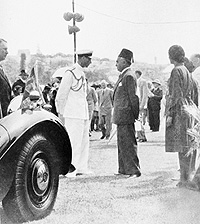 At Curries Fountain. The King chatting with "A.I" after reviewing Indian girl guides
At Curries Fountain. The King chatting with "A.I" after reviewing Indian girl guides
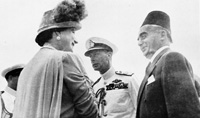 "A.I." exchanges smile with the queen
"A.I." exchanges smile with the queen
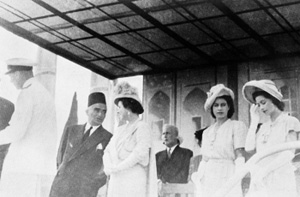 The King and Queen with the two princesses on the dais at Curries Fountain, Senator D.G. Shepstone in the background
The King and Queen with the two princesses on the dais at Curries Fountain, Senator D.G. Shepstone in the background
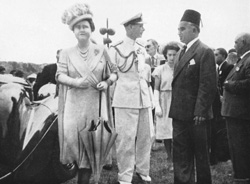 "A.I." chatting with his majesty
"A.I." chatting with his majesty
A few questions in the House of Assembly, a headline in a newspaper, a rumour in the streets could cost Congress hundreds of pounds and Kajee a year's salary. A question was asked in Parliament as to how things were working out and was answered with a casualness which suggested that the public had forgotten what things were to be worked out.